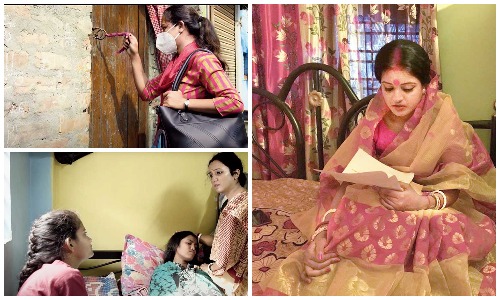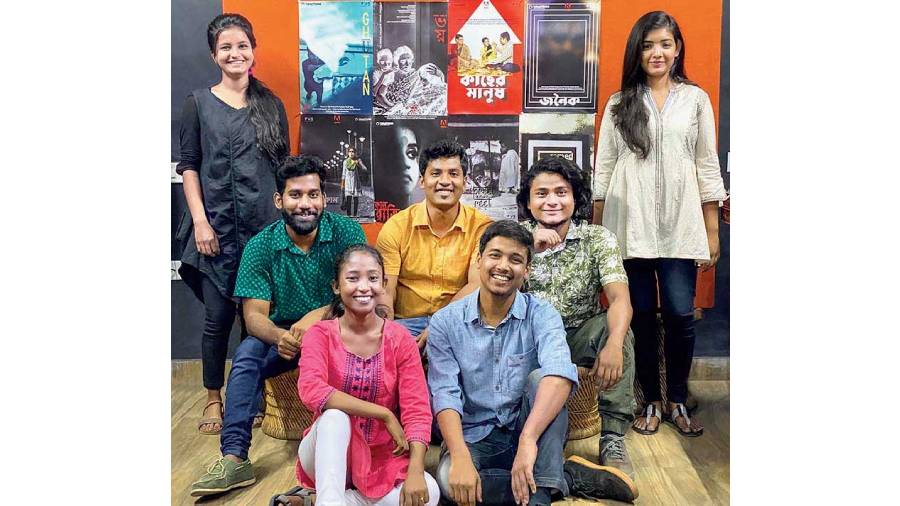A clutch of eight short films, highlighting facets of the pandemic year, was screened in CG Block on Saturday. The cast and crew comprised youngsters staying in neighbouring slums and colonies who have been trained in the craft at Prayasam Visual Basics, the audio-visual unit of the NGO Prayasam, supported by software giant Adobe.
“Every year, we organise the Bad and Beautiful Film Festival to showcase films made by our youth. Adobe, which funds the films, wanted films centred around the pandemic,” said Amlan Ganguly, the Prayasam chief.
The NGO had some stories ready. “Every afternoon during the lockdown, Dada used to do a conference call with us. We discussed incidents reported in newspapers and things we saw in the colony,” said Priya Sutradhar, who made Kalratri. The film is inspired by an incident in which two people who tested positive for Covid-19 got taken away and never returned. “The rest of the family, herded into an isolation centre, never learnt what happened to them. In those days, families were not allowed to see the dead for fear of infection from the bodies,” added Ganguly.

Stills from three of the short films they made — (Clockwise from left) Welcome. Kalratri and Bhoy
The film has Priya’s friend Monalisa Mondol play a bride the night after her wedding. Her husband has developed symptoms and she is awaiting the Covid screening report, amid conflicting emotions — fear of him testing positive, anticipation about the wedding reception and excitement of starting life with her beloved. The film ends with an in-law telling her that her husband had been taken away and asks her to pack quickly to leave for an isolation centre.
Another film shows how the fear of being removed from home could cloud decisions on treatment. Monalisa’s own film Bhoy has a girl with high fever being hidden from neighbours and being medicated at home without consultation. Her condition deteriorates and by the time people get to know, she is beyond help. “Such an incident happened in our area. The girl died of medicine overdose. Later it was found that she did not have Covid,” said Monalisa, a Mahisbathan resident.
A poignant tale of bereavement is told in Salim Ganguly’s Framed. A daughter gaily chats with her mother at home, planning for life beyond Covid. As the bell rings, the mother says: “Oi bodh hoy tor baba elo” and the camera moves towards the door but with unusual slowness. A man walks into the room but it is empty and on the will is framed the mother-daughter selfie that they were shown taking seconds ago. A statistic of Covid deaths scrolls on screen with the credits, leaving a chilling realisation.
Relationships have also been affected in the lockdown, positively in some cases and negatively in others. Manish Chowdhury’s film Jawnoiko has a man, almost out of his mind possibly due to confinement in a single room, hallucinating about a girl he has throttled and whose body he has hidden in the house. “Such an incident took place in Patuli where a tutor killed a student for no apparent reason,” Manish said. Sujit Datta’s Ghutan is another example of lockdown-induced mental trauma. Welcome, by Abida Khatun, underlines the Covid Warriors’ harassment in their locality, as local boys taunt a nurse as “Corona didi”.
In contrast, the lockdown helped Rupa Biswas forge a bond with her father, who was rarely home before. The actors in Kachher Manush are her parents. “My mother was so shy that she kept breaking into a laugh every time I rolled the camera. I made them act, promising there were no dialogues,” said the girl, who used self-composed poems as background narration. In Rahul Shaw’s Preet Na Maney Reet, lovers refuse to let a pandemic keep them apart as a migrant worker returns from the village to his ironer partner in the city as soon as the lockdown ends, despite having lost his city job.
“The films were shot in a day or half as we had to submit them to Adobe by the month-end. To ensure social distancing, we had one or two actors in most stories,” says Ganguly.
The films were screened in several locations over three months and audience votes taken in multiple categories. The prizes were given away recently.
Manju Roy was adjudged Best Actress for her understated turn as a nurse in Welcome. Framed and Welcome got three awards each.











